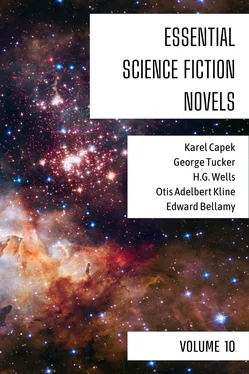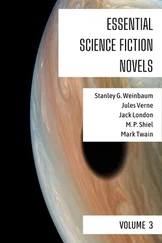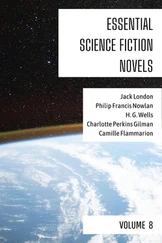Such are the most striking natural appearances on one side of this satellite. On the other there is some difference. The sun pursues the same path in the corresponding latitudes of both hemispheres; but being without any moon, they have a dull and dreary night, though the light from the stars is much greater than with us. The science of astronomy is much cultivated by the inhabitants of the dark hemisphere, and is indebted to them for its most important discoveries, and its present high state of improvement.
If there is much rivalship among the natives of the same hemisphere, who differ in the length of their shadows, they all unite in hatred and contempt for the inhabitants of the opposite side. Those who have the benefit of a moon, that is, who are turned towards the earth, are lively, indolent, and changeable as the face of the luminary on which they pride themselves; while those on the other side are more grave, sedate, and industrious. The first are called the Hilliboos, and the last the Moriboos—or bright nights, and dark nights. And this mutual animosity is the more remarkable, as they often appeared to me to be the same race, and to differ much less from one another than the natives of different climates. It is true, that enlightened and well educated men do not seem to feel this prejudice, or at least they do not show it: but those who travel from one hemisphere to the other, are sure to encounter the prejudices of the vulgar, and are often treated with great contempt and indignity. They are pointed at by the children, who, according as they chance to have been bred on one side or the other say, "There goes a man who never saw Glootin," as they call the earth; or, "There goes a Booblimak," which means a night stroller.
All bodies are much lighter on the moon than on the earth; by reason of which circumstance, as has been mentioned, the inhabitants are more active, and experience much less fatigue in ascending their precipitous mountains. I was astonished at first at this seeming increase in my muscular powers; when, on passing along a street in Alamatua, soon after my arrival, and meeting a dog, which I thought to be mad, I proposed to run out of his way, and in leaping over a gutter, I fairly bounded across the street. I measured the distance the next day, and found it to be twenty-seven feet five inches; and afterwards frequently saw the school-boys, when engaged in athletic exercises, make running leaps of between thirty and forty feet, backwards and forwards. Another consequence of the diminished gravity here is, that both men and animals carry much greater burdens than on the earth.
The carriages are drawn altogether by dogs, which are the largest animals they have, except the zebra, and a small buffalo. This diminution of gravity is, however, of some disadvantage to them. Many of their tools are not as efficient as ours, especially their axes, hoes, and hammers. On the other hand, when a person falls to the ground, it is nearly the same thing as if an inhabitant of the earth were to fall on a feather bed. Yet I saw as many instances of fractured limbs, hernia, and other accidents there, as I ever saw on the earth; for when they fall from great heights, or miscarry in the feats of activity which they ambitiously attempt, it inflicts the same injury upon them, as a fall nearer the ground does upon us.
After we had been here sufficiently long to see what was most remarkable in the city, and I had committed the fruit of my observations to paper, the Brahmin proposed to carry me to one of the monthly suppers of a philosopher whom he knew, and who had obtained great celebrity by his writings and opinions.
We accordingly went, and found him sitting at a small table, and apparently exhausted with the labour of composition, and the ardour of intense thought. He was a small man, of quick, abrupt manners, occasionally very abstracted, but more frequently voluble, earnest, and disputatious. He frankly told us he was sorry to see us, as he was then putting the last finish to a great and useful work he was about to publish: that we had thus unseasonably broken the current of his thoughts, and he might not be able to revive it for some days. Upon my rising to take my leave, he assured me that it would be adding to the injury already done, if we then quitted him. He said he wished to learn the particulars of our voyage; and that he, in turn, should certainly render us service, by disclosing some of the results of his own reflections. He further remarked, that he expected six or eight friends—that is, (correcting himself,) "enlightened and congenial minds," to supper, on the rising of a constellation he named, which time, he remarked, would soon arrive. Finding his frankness to be thus seasoned with hospitality, we resumed our seats. It soon appeared that he was more disposed to communicate information than to seek it; and I became a patient listener. If the boldness and strangeness of his opinions occasionally startled me, I could not but admire the clearness with which he stated his propositions, the fervour of his elocution, and the plausibility of his arguments.
The expected guests at length arrived; and various questions of morals and legislation were started, in which the disputants seemed sometimes as if they would have laid aside the character of philosophers, but for the seasonable interposition of the Brahmin. Wigurd, our host, often laboured with his accustomed zeal, to prove that every one who opposed him, was either a fool, or biassed by some petty interest, or the dupe of blind prejudice.
After about two hours of warm, and, as it seemed to me, unprofitable discussion, we were summoned to our repast in the adjoining room. But before we rose from our seats, our host requested to know of each of us if we were hungry; and, whether it were from modesty, perverseness, or really because they had no appetite, I know not, but a majority of the company, in which I was included, voted that their hour of eating was not yet come: upon which Wigurd remarked that his own vote, as being at home, and the Brahmin's, as being at once a philosopher and a stranger, should each count for two; and by this mode of reckoning there was a casting vote in favour of going to supper.
We found the table covered with tempting dishes, served up in a costly and tasteful style, and a sprightly, well-looking female prepared to do the honours of the feast. She reproved our host for his delay, and told him the best dish was spoiled, by being cold. I was fearful of a discussion; but he sat down without making a reply, and immediately addressing the company, descanted on the various qualities of food, and their several adaptations to different ages, constitutions, and temperaments. He condemned the absurd practice which prevailed, for the master or mistress of the house to lavish entreaties on their guests to eat that which they might be better without; and insisted, at the same time, that the guests ought not to consult their own tastes exclusively. He maintained, that the only course worthy of rational and benevolent beings, was for every man to judge for his neighbour as well as for himself; and, should any collision arise between the different claimants, then, if any one were guided by that decision, which an honest and unbiassed judgment would tell him was right, they would all come to the same just and harmonious result.
"But," added he, "you have not yet been sufficiently prepared for this disinterested operation. As ye have proved this night that ye are not yet purged of the feelings and prejudices of a vicious education, I will perform this office for you all, and set you an example, by which ye may hereafter profit. To begin, then, with you—(addressing himself to a corpulent man, of a florid complexion, at the lower end of the table:)—As you already have a redundancy of flesh and blood, I assign the soupe maîgre to you; while to our mathematical friend on this side, whose delicate constitution requires nourishment, I recommend the smoking ragoût. This cooling dish will suit your temperament," said he to a third; "and this stimulating one, yours," to a fourth. "Those little birds, which cost me five pieces, I shall divide between my terrestrial friend here (looking at the Brahmin) and myself, we being the most meritorious of the company, and it being of the utmost importance to society, that food so wholesome should give nourishment to our bodies, and impart vigour and vivacity to our minds."
Читать дальше












